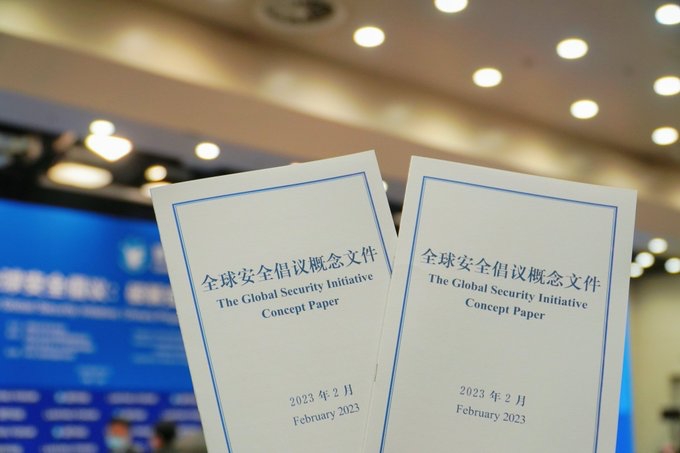The world, amid unprecedented challenges, is faced with multiple security dilemmas. Durable peace and universal security have become, more than ever, the common aspiration of people around the world. In addressing the historic trendand answering the call of our time, Chinese President Xi Jinping has put forward the Global Security Initiative (GSI), which provides the world new ideas and approaches for bridging the peace deficit and tackling the security dilemma. The GSI has been widely applauded in the international community since its unveiling nearly one year ago. Then on February 21, Chinese Foreign Minister Mr. Qin Gang announced the release of the Global Security Initiative Concept Paper, another major step byChina to facilitate deeper understandings of the GSI so as to invite active participation and implementation to achieve more early harvests.
The concept paper systematically expounds the core ideas and principles of the GSI. For example, it lays out the internal rationale among the six pillar principles of the GSI. First, the vision of common, comprehensive, cooperative and sustainable security, which provides conceptual guidance. Second, respecting the sovereignty and territorial integrity of all countries, which is the basic premise. Third,abiding by the purposes and principles of the UN Charter, which is a primary benchmark. Fourth, taking the legitimate security concerns of all countries seriously, which is an important principle. Fifth, peacefully resolving differences and disputes between countries through dialogue and consultation, which is a must choice. Sixth, maintaining security in both traditional and non-traditional domains, which is an inherent requirement.
The concept paper sets out the priorities and mechanisms of the GSI cooperation. It’s 20 priorities of cooperation are all highly action-oriented, and they could be summarized as five orientations: The first is upholding the UN’s central role in security governance. The authority of the UN should be safeguarded. The UN should be supported in its efforts to prevent war and conflict, develop the peace-building architecture and promote post-war reconstruction, and in playing a bigger role in global security affairs. The second is promoting coordination and sound interactions among major countries. Major countries should take the lead in upholding equality, cooperation and the rule of law. Hegemonic, bullying and domineering practices should be rejected, and joint efforts should be made to build a framework of major-country relations featuring peaceful coexistence, overall stability and balanced development. The third is facilitating peaceful settlement of hotspot issues through dialogue. Support should be extended to the parties involved to settle their disputes and differences through dialogue and consultation. The international community should speak up for justice, cool down hotspots and deflate tensions. The fourth is tackling traditional and non-traditional security challenges. It is important to promote global strategic stability, oppose arms race, and defuse nuclear war risks. Combined efforts are needed to fight COVID-19, combat terrorism, and safeguard data security, bio-security and the stability of supply and scientific and technological chains. The fifth is strengthening the system and capacity for global security governance. A security governance architecture featuring coordination among governments and international organizations and participation of non-governmental organizations should be developed.
The concept paper makes clear five principles of China in implementing the GSI. First, mutual respect. The purposes and principles of the UN Charter must be observed. The equality among countries regardless of size, strength and wealth should be upheld. Different systems, religions and civilizations should be treated as equals. The core interests of all countries and legitimate security concerns of all parties should be respected. Second, openness and inclusion. The GSI targets no particular country, and excludes no particular party. All countries are welcome to join in the GSI if they so wish; and all efforts for global peace and development will be supported. Third, multilateralism. Bilateral and multilateral security cooperation should be pursued among countries around the world and international and regional organizations in line with the principle of extensive consultation, joint contribution and shared benefits. Issues that matter to all should be addressed by all. Greater synergy should be forged among various security visions to seek the greatest possible common ground. Fourth, mutual benefit and win-win. The principle of indivisible security should be followed. One’s own security and the common security of all should be advanced side by side, by pursuing win-win cooperation that contributes to each other’s progress, and opposing zero-sum game that benefits oneself at the cost of others, to expand the converging interests among all. Fifth, a holistic approach. Security governance needs to be advanced in a coordinated manner, and traditional and non-traditional security threats should be tackled in a holistic way. Equal emphasis should be placed on security and development, to eliminate the breeding ground for insecurity and seek fundamental and durable ways for achieving sustainable security.
Global security initiative is a vivid practice of the concept of the community with a shared future for mankind in the field of security. China and Africa are always building our community, and mutual assistance in security is one of the “five pillars” of China-Africa cooperation. For partners as close as China and Africa, the GSI and its concept paper can serve as a clearer and more specific road-map for jointly building a China-Africa community with a shared secure future. This holds particularly true to Somalia, a country in the difficult process of pursuing national security and stability.
The GSI embodies the core concepts of the vision of a community with a shared future for mankind, which is in line with the joint efforts of China and Somalia. The GSI adheres to the principle of “undivided security”, pointing out that all countries need to take holistic strategy to address both the symptoms and root causes, which echoes with Somalia’s triple-dimensional anti-terrorism ideas, namely a combination of the military, finance and ideological field measures. The GSI calls on to support the efforts of African countries to promote security and strengthen their ability to safeguard peace independently, promote peaceful settlement of hotspots in areas such as the Horn of Africa, actively implement the Outlook on Peace and Development in the Horn of Africa, and promote the institutionalization of the China-Horn of Africa Peace, which will foster the interests of regional countries including Somalia.
China and Somalia have a deep andtraditional friendship. Our two countries have always been understanding, respecting and supporting each other on bilateral and multilateral occasions, including jointly addressing various traditional and non-traditional security threats. The Chinese side believes that the GSI will help our two countries strengthen cooperation in the field of peace and security by providing a top-down design guidance and practical solution for the implementation of the “Peace and Security Initiative” and the “Cooperation Initiative on Security and Stability”, which were respectively proposed at the 8th Ministerial Conference of the FOCAC and the first China-Arab Summit. China is committed to working unremittingly with Somalia in building a community with a shared future for mankind and fostering a more peaceful, secure, and prosperous Africa and world.
By: Mr. Chen Wendi
Chargé d’affaires, Chinese Embassy in Somalia





